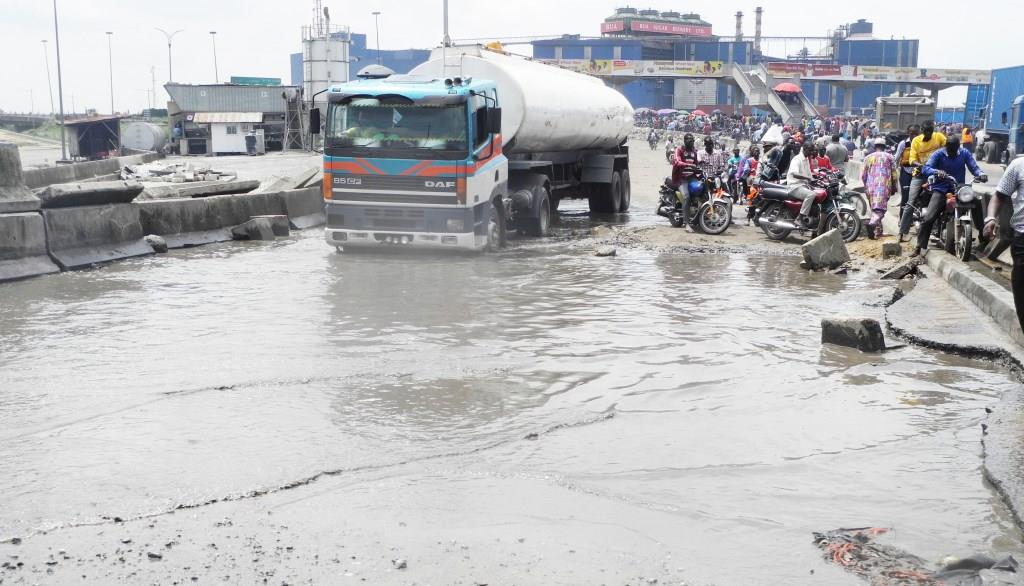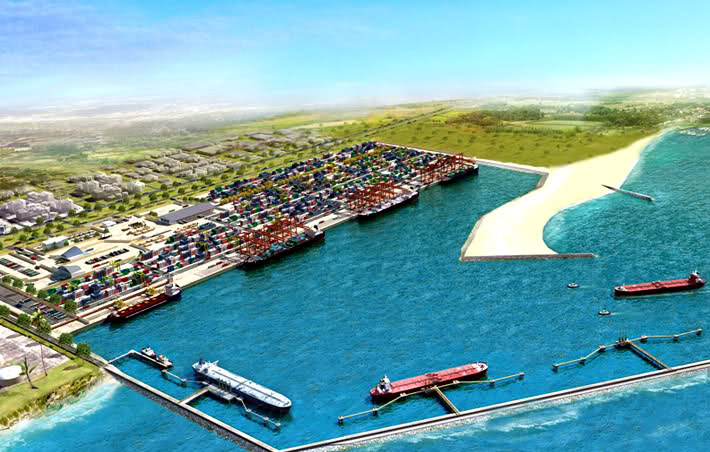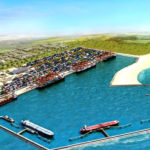Economy
FG Loses N6trn in Revenue to Apapa Gridlock

By Adedapo Adesanya
The Organised Private Sector (OPS) has said the perennial gridlock in the Apapa area of Lagos State was making federal government of Nigeria lose not less than N6 trillion annually across all sectors of the economy.
Second Vice President of the Nigeria Employers’ Consultative Association (NECA), Mr Mauricio Alarcon, made this disclosure yesterday when the organisation paid a courtesy visit to President Muhammadu Buhari at the State House in Abuja.
Mr Alarcon noted that operational hitches being experienced at the port has persisted, even a year after the Presidential Executive Order aimed to promote transparency and efficiency.
The NECA chief said there was an urgent need for policy reforms to enable businesses operate efficiently in the area as it can bring about serious boost to the nation’s economy.
“There is the need to fast-track infrastructural development at the Lagos Port, diversification programme, market-driven foreign exchange management, sustain and a significant reduction in the cost of governance and address the Apapa gridlock,” he said.
According to the survey by the OPS, Nigeria lost about N3.06 trillion on non-oil export and about N2.5 trillion earnings annually across different sectors of the country’s economy.
This is of importance because the Apapa Port Road, which is the heart of the nation’s non-oil economy, has remained in a state of disrepair for a long period of time.
This is happening despite experts’ continuous call for action, as well as the fact that Nigeria is losing large amounts of money to the problem. It should also be noted that imports are often trapped in the ports for days, as a result of traffic gridlock.
Also, the Apapa and Tin Can Island Ports handle about 80 percent of the cargoes that come into Nigeria. The situation has affected businesses depending on the ports efficient operations and has led many companies to relocate to better and more accessible routes in the country.
Just recently, Dangote’s NASCON Allied Industries Plc moved some of its operations away from the Apapa area of Lagos to Oregun and Port Harcourt as a result of the gridlock.
Economy
Lekki Deep Sea Port Reaches 50% Designed Operational Capacity

By Adedapo Adesanya
The Managing Director of Lekki Port LFTZ Enterprise Limited, Mr Wang Qiang, says the port has reached half of its designed operational capacity, with steady growth in container throughput since September 2025, reflecting increasing confidence by shipping lines and cargo owners in Nigeria’s first deep seaport.
“We already reached 50 per cent of our capacity now, almost 50 per cent of the port capacity.
“There is consistent improvement in the number of 20ft equivalent units (TEUs) handled monthly,” he said.
Mr Qiang explained further that efficient multimodal connectivity remains critical to sustaining and accelerating growth at the port.
According to him, barge operations have become an important evacuation channel and currently account for about 10 per cent of cargo movement from the port.
Mr Qiang mentioned that the ongoing Lagos–Calabar Coastal Road project would help ease congestion and improve access to the port.
He said that rail connectivity remained essential, particularly given the scale of industrial activities emerging within the Lekki corridor.
He said that Nigeria Government was concerned about the cargoes moving through rail and that the development would enhance more cargoes distribution outside the port.
Mr Qiang reiterated that Lekki port was a fully automated terminal, noting that delays may persist until all stakeholders, including government agencies, fully aligned with end-to-end digital processes.
He explained that customs procedures, particularly physical cargo examinations, and other port services should be fully digitalised to significantly reduce cargo dwell time.
“We must work together very closely with customers and all categories of operations for automation to yield results.
“Integration between the customs system, the terminal operating system and customers is already part of an agreed implementation schedule.
“For automation to work efficiently, all players must be ready — customers, government and every stakeholder. Only then can we have a fantastic system,” Mr Qiang said.
He also stressed that improved connectivity would allow the port to effectively double capacity through performance optimisation without expanding its physical footprint.
Economy
Investors Reaffirm Strong Confidence in Legend Internet With N10bn CP Oversubscription

By Aduragbemi Omiyale
The series 1 of the N10 billion Commercial Paper (CP) issuance of Legend Internet Plc recorded an oversubscription of 19.7 per cent from investors.
This reaffirmed the strong confidence in the company’s financial stability and growth trajectory.
The exercise is a critical component of Legend Internet’s N10 billion multi-layered financing programme, designed to support its medium- to long-term growth.
Proceeds are expected to be used for broadband infrastructure expansion to deepen nationwide penetration, optimise the organisation’s working capital for operational efficiency, strategic acquisitions that will strengthen its market position and accelerate service innovation.
The telecommunications firm sees the acceptance of the debt instruments as a response to its performance, credit profile, and disciplined operational structure, noting it also reflects continued trust in its ability to execute on its strategic vision for nationwide digital infrastructure expansion.
“The strong investor participation in our Series 1 Commercial Paper issuance is both encouraging and validating. It demonstrates the market’s belief in our financial integrity, operational strength, and long-term vision for digital infrastructure growth. This support fuels our commitment to building a more connected, competitive, and digitally enabled Nigeria.
“This milestone is not just a financing event; it is a strategic enabler of our expansion plans, working capital needs, and future acquisitions. We extend our sincere appreciation to our investors, advisers, and market partners whose confidence continues to propel Legend Internet forward,” the chief executive of Legend Internet, Ms Aisha Abdulaziz, commented.
Also commenting, the Chief Financial Officer of Legend Internet, Mr Chris Pitan, said, “This achievement is powered by our disciplined financing framework, which enables us to scale sustainably, innovate continuously, and consistently meet the evolving needs of our customers.
“We remain committed to building a future where every connection drives opportunity, productivity, and growth for communities across Nigeria.”
Economy
Tinubu to Present 2026 Budget to National Assembly Friday

By Adedapo Adesanya
President Bola Tinubu will, on Friday, present the 2026 Appropriation Bill to a joint session of the National Assembly.
The presentation, scheduled for 2:00 pm, was conveyed in a notice issued on Wednesday by the Office of the Clerk to the National Assembly.
According to the notice, all accredited persons are required to be at their duty posts by 11:00 am on the day of the presentation, as access into the National Assembly Complex will be restricted thereafter for security reasons.
The notice, signed by the Secretary, Human Resources and Staff Development, Mr Essien Eyo Essien, on behalf of the Clerk to the National Assembly, urged all concerned to ensure strict compliance with the arrangements ahead of the President’s budget presentation.
The 2026 budget is projected at N54.4 trillion, according to the approved 2026–2028 Medium-Term Expenditure Framework (MTEF) and Fiscal Strategy Paper (FSP).
Meanwhile, President Tinubu has asked the National Assembly to repeal and re-enact the 2024 appropriation act in separate letters to the Senate and the House of Representatives on Wednesday and read during plenary by the presiding officers.
The bill was titled Appropriation (Repeal and Re-enactment Bill 2) 2024, involving a total proposed expenditure of N43.56 trillion.
In a letter dated December 16, 2025, the President said the bill seeks authorisation for the issuance of a total sum of N43.56 trillion from the Consolidated Revenue Fund of the Federation for the year ending December 31, 2025.
A breakdown of the proposed expenditure shows N1.74 trillion for statutory transfers, N8.27 trillion for debt service, N11.27 trillion for recurrent (non-debt) expenditure, and N22.28 trillion for capital expenditure and development fund contributions.
The President said the proposed legislation is aimed at ending the practice of running multiple budgets concurrently, while ensuring reasonable – indeed unprecedentedly high – capital performance rates on the 2024 and 2025 capital budgets.
He explained that the bill also provides a transparent and constitutionally grounded framework for consolidating and appropriating critical and time-sensitive expenditures undertaken in response to emergency situations, national security concerns, and other urgent needs.
President Tinubu added that the bill strengthens fiscal discipline and accountability by mandating that funds be released strictly for purposes approved by the National Assembly, restricting virement without prior legislative approval, and setting conditions for corrigenda in cases of genuine implementation errors.
The bill, which passed first and second reading in the House of Representatives, has been referred to the Committee on Appropriations for further legislative action.
-

 Feature/OPED6 years ago
Feature/OPED6 years agoDavos was Different this year
-
Travel/Tourism9 years ago
Lagos Seals Western Lodge Hotel In Ikorodu
-

 Showbiz3 years ago
Showbiz3 years agoEstranged Lover Releases Videos of Empress Njamah Bathing
-

 Banking7 years ago
Banking7 years agoSort Codes of GTBank Branches in Nigeria
-

 Economy3 years ago
Economy3 years agoSubsidy Removal: CNG at N130 Per Litre Cheaper Than Petrol—IPMAN
-

 Banking3 years ago
Banking3 years agoFirst Bank Announces Planned Downtime
-

 Banking3 years ago
Banking3 years agoSort Codes of UBA Branches in Nigeria
-

 Sports3 years ago
Sports3 years agoHighest Paid Nigerian Footballer – How Much Do Nigerian Footballers Earn













